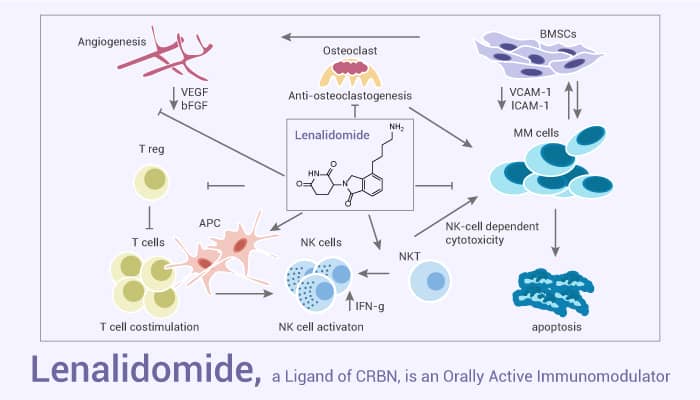Immunomodulatory imide drugs (IMiDs) are a class of immunomodulatory drugs containing an imide group. The discovery of anti-angiogenic and anti-inflammatory properties promoted the development of Thalidomide analogs. These compounds bind Cereblon (CRBN), the substrate adaptor for the CRBN-CRL4 E3 ubiquitin ligase, and modulate the substrate specificity of the enzyme. In addition, these drugs induce degradation of two lymphoid transcription factors-IKZF1 and IKZF3-leading to dramatic clinical efficacy in multiple myeloma.
Lenalidomide (also known as CC-5013), a Thalidomide analog, is an orally active immunomodulatory agent. Lenalidomide is a ligand of ubiquitin E3 ligase cereblon (CRBN). Furthermore, it induces the ubiquitination of casein kinase 1A1 (CK1α) by the CRBN-CRL4 E3 ubiquitin ligase, resulting in CK1α degradation exclusively in human cells. Jan Krönke found that mouse cells are resistant to Lenalidomide, but changing a single amino acid in mouse CEBN to the corresponding human residue can cause Lenalidomide-dependent degradation of CK1α. Moreover, Lenalidomide causes selective ubiquitination and degradation of two lymphoid transcription factors, IKZF1 and IKZF3, by the CRBN-CRL4 ubiquitin ligase. The most important is,, Lenalidomide is a highly effective treatment for myelodysplastic syndrome (MDS) and multiple myeloma (MM).

Lenalidomide specifically inhibits growth of mature B-cell lymphomas, deletes the chromosome 5q (del(5q)), and induces IL-2 release from T cells. In vitro, Lenalidomide selectively induces apoptosis of del(5q) MDS cells. In vivo, treatment of lymphoma-bearing mice with Lenalidomide leads to a significant decrease in tumor growth and lymphoma cell spread.
To sum up, Lenalidomide, a ligand of CRBN, is an orally active immunomodulator with antineoplastic effects.
References:
[1] Jan Krönke, et al. Nature. 2015 Jul 9;523(7559):183-188.
[2] Caterina Lapenta, et al. Cancer Immunol Immunother. 2019 Nov;68(11):1791-1804.